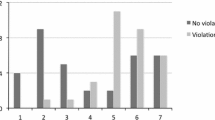Abstract
I defend a Davidsonian approach to weakness of will against some recent arguments by John McDowell and adapt the approach to meet other objections. Instead of treating one’s better judgement as a conditional judgement about what is desirable to do given available reasons, it is proposed to treat it as an unconditional judgement about what is desirable to do from a rational perspective that one takes to be the right perspective to have. This makes sense of Aristotle’s claim that desire is for the good or the apparent good: judgements of desirability generally concern the apparent good, whereas judgements of desirability from rational perspectives that are judged to be the ones to have are judgements of the actual good. Weakness of will occurs when one’s actual rational perspective is not the one that one takes to be the one to have—i.e. when one’s judgement of the apparent good does not coincide with one’s judgement of the actual good. One makes two judgements—one from an adopted perspective that one judges to be the one to have and one from one’s actual perspective.
This chapter is in its final form and it is not submitted for publication anywhere else.
Access this chapter
Tax calculation will be finalised at checkout
Purchases are for personal use only
Similar content being viewed by others
Notes
- 1.
Davidson (1980, 101). I will preserve Davidson’s talk of ‘judging’ and ‘judgement’ in this discussion, even though such talk gives the misleading impression that intending is taken to be an action of some sort. I mean nothing more by these terms than would be expressed by talking about thinking. Thinking that ϕ-ing is desirable does not require any conscious or unconscious mental action and may be understood in completely dispositional terms.
- 2.
See for example Davidson (1980, 87).
- 3.
- 4.
Davidson (1980, 38–41).
- 5.
I think this fits what Price (2008, Chap. 1) is claiming in a useful discussion of Kenny’s logic of satisfactoriness when he says that it is not best thought of as a logic as such.
- 6.
- 7.
Davidson (1980, 35 ff.).
- 8.
This is Tenenbaum’s (1999) criticism of Davidson’s account.
- 9.
See Stout (2019) where I respond in more detail to this suggestion of McDowell.
- 10.
Remember a rational perspective in this discussion should be thought of as associated with a way of reasoning practically.
- 11.
See for example Bratman (1979) who insists that better judgements need not be conditional in form.
- 12.
See Nicomachean Ethics 1113a23-31 and De Anima 433a26-29. I make no claim that this is the right way to understand Aristotle.
- 13.
Contrast a company ‘Yes-Man’ who loses themselves in the company way of behaving and Melville’s Bartelby who refuses to adopt a perspective other than his own at work, replying ‘I would prefer not to’, when given instructions by his employer. Bartleby’s almost noble refusal to ‘play the game’ extends into a self-destructive rigidity of mind leading to his eventually refusing food that someone else thinks he should eat and starving to death in prison.
- 14.
Sarah Buss takes a similar line, though her focus on ‘all things considered’ judgements is misplaced in my view. ‘On my account, then, the characteristic perversity of weak-willed action lies not in a conflict between the weak-willed agent’s all-things-considered evaluative judgement and her intention, but in a conflict between her actual all-things-considered evaluative judgement and the all-things-considered evaluative judgement, she believes she would have reached if, when she acted, she had accepted the authority of her own reason”. (Buss 1997, 36).
References
Anscombe, G. E. M. (1957). Intention. Cambridge MA: Harvard University Press.
Bratman, M. (1979). Practical reasoning and weakness of Will. Nous, 13(2), 153–171.
Buss, S. (1997). Weakness of Will. Pacific Philosophical Quarterly, 78(1), 13–44.
Davidson, D. (1980). Essays on actions and events. Oxford: Oxford University Press.
Kenny, A. (1975). Will, Freedom and Power. Oxford: Blackwell.
McDowell, J. (2010). What is the content of an intention in action. Ratio, 23, 415–432.
Price, A. (2008). Contextuality in practical reason. Oxford: Oxford University Press.
Rödl, S. (2007). Self-consciousness. Cambridge MA: Harvard University Press.
Stout, R. (2019). Practical reasoning and practical knowledge. Canadian Journal of Philosophy, 49(4), 564–579.
Tenenbaum, S. (1999). The judgment of a weak will. Philosophy and Phenomenological Research, 59(4), 875–911.
Thompson, M. (2008). Life and action. Cambridge MA: Harvard University Press.
Author information
Authors and Affiliations
Corresponding author
Editor information
Editors and Affiliations
Rights and permissions
Copyright information
© 2021 Springer Nature Singapore Pte Ltd.
About this chapter
Cite this chapter
Stout, R. (2021). Acting Against Your Better Judgement. In: Yang, S.CM., Myers, R.H. (eds) Donald Davidson on Action, Mind and Value. Logic in Asia: Studia Logica Library. Springer, Singapore. https://doi.org/10.1007/978-981-15-7230-2_3
Download citation
DOI: https://doi.org/10.1007/978-981-15-7230-2_3
Published:
Publisher Name: Springer, Singapore
Print ISBN: 978-981-15-7229-6
Online ISBN: 978-981-15-7230-2
eBook Packages: Religion and PhilosophyPhilosophy and Religion (R0)




